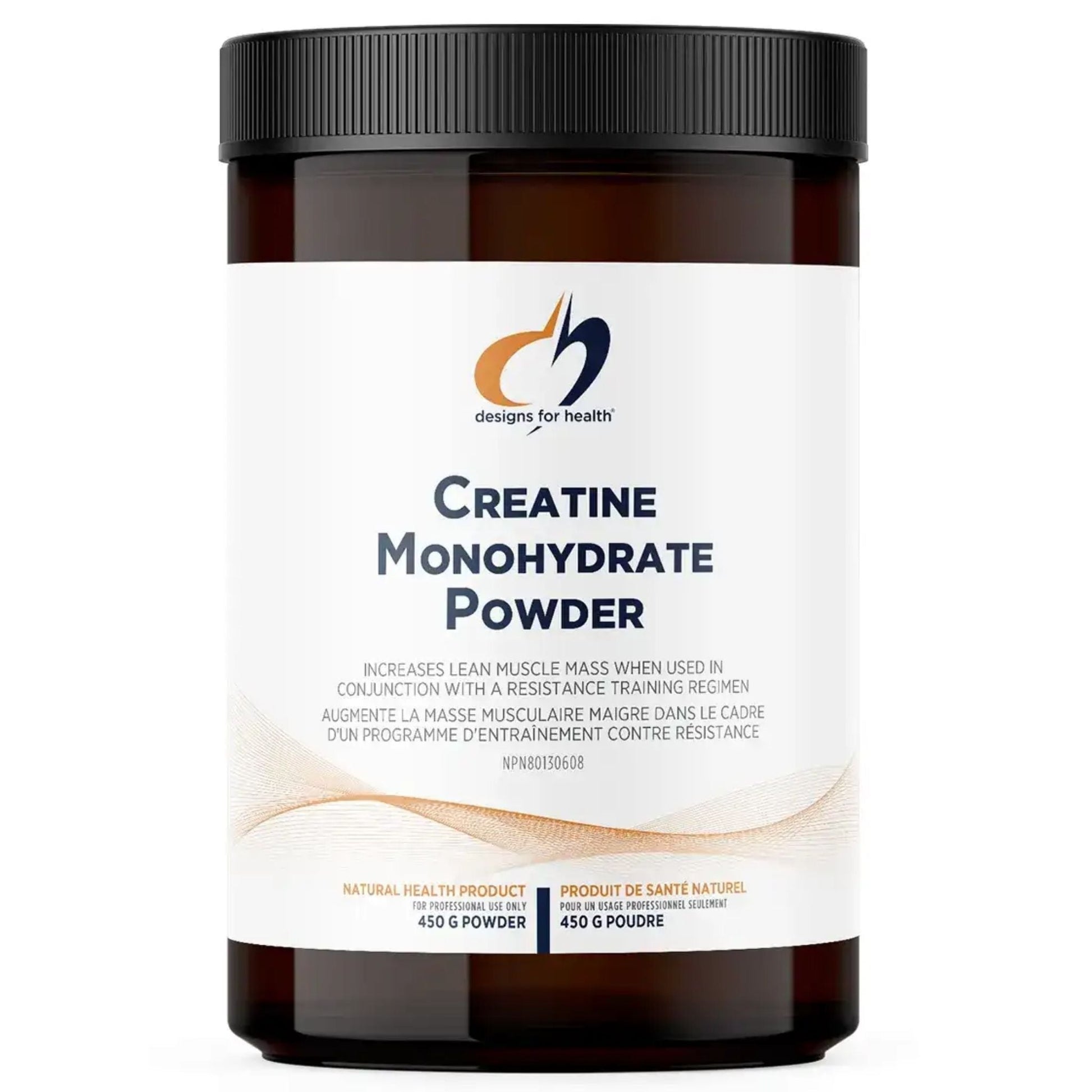
Designs For Health Creatine Monohydrate 450g
Reliable shipping
Flexible returns
Designs For Health Creatine Monohydrate Details
Creatine Monohydrate is the most extensively studied supplement to promote exercise performance and help maintain muscle mass during the natural aging process. Each scoop provides 5 g of micronized creatine in a convenient unflavoured and unsweetened powder that rapidly dissolves in liquid. Designs for Health Creatine Monohydrate utilizes micronized technology allowing for improved absorption and digestibility and enhanced bioavailability to targeted muscle tissue. This formula is ideal for athletes, older individuals and aging populations, and vegans or vegetarians who do not consume adequate amounts of amino acid precursors or creatine-rich foods.
Designs For Health Creatine Monohydrate Features and Benefits
- No artificial flavours or sweeteners
- 5 g of micronized creatine per scoop
- Convenient powder delivery for titration flexibility
- Gluten-free, dairy-free, soy-free, and non-GMO
- Neutral taste unflavoured and unsweetened powder for increased compliance
- Formulated with micronized technology for enhanced bioavailability, absorption, and solubility
Creatine is involved in muscular contraction with approximately 95% being stored in skeletal muscle, particularly type 2 fibers. Two-thirds of intramuscular creatine is phosphocreatine (PCr) and the remaining one-third is free creatine. Dietary creatine is found primarily in red meat and seafood. Individuals who consume creatine-rich foods may have higher tissue creatine levels than those who do not, such as vegans and vegetarians. Human physiology has a limited capacity for producing creatine on its own, making it important to obtain adequate amounts from food or supplementation. Between 1% to 2% of creatine in the muscle is metabolized and excreted through the urine. Therefore, the body requires between 1 and 3 grams of creatine per day to maintain normal creatine stores, dependent on an individual’s muscle mass, and even more for muscle growth. PCr is used to generate cellular energy in skeletal muscles in the form of ATP, which is the fuel to contract muscles and perform other metabolic tasks. Creatine supplementation can promote the capacity of ATP production, which supports performance output.
Exercise Performance & Muscle Hypertrophy
Creatine monohydrate is the most extensively studied and considered the most effective and safe ergogenic supplement for promoting high-intensity exercise capacity and lean body mass during training.1-3 It is well-established in scientific research that creatine supplementation leads to an increase in muscle creatine concentrations, production of cellular energy as ATP, and enhanced anaerobic intermittent exercise performance, which supports on-field performance for competitive athletes.3 Short- and long-term ergogenic benefits of creatine supplementation have been demonstrated in both trained and untrained men and women, including nonathletes. Previously untrained females who supplemented creatine while doing 10 weeks of a self-designed training program had 20% to 25% improvements in muscular strength.
In conjunction with a resistance training program, 28 days of creatine supplementation resulted in greater lean muscle mass, training volume, and sprint performance for NCAA Division I collegiate football players.3 Several other studies in collegiate football players demonstrated significant improvements in bench press, squat scores, and overall strength gains, power, and anaerobic capacity compared to the placebo groups.3 Evidence also shows that supplementation can enhance recovery and may reduce muscle damage caused by intense exercise, supporting overall training performance.
Healthy Aging & Brain Function
Creatine monohydrate is also emerging as a potential nutritional intervention capable of improving health in aging. Creatine levels decline with age and muscle strength declines at a rate of 1.2% to 1.5% per year after age 50.4 Research shows creatine has beneficial effects for maintaining lean muscle at any age, especially in older individuals. A meta-analysis showed that older adults receiving creatine supplementation had significantly increased lean body mass and upper and lower body muscle strength during resistance training. This suggests that creatine supplementation may help reduce the risk of age-related muscle loss in the aging population.1,5 In aging bone, emerging research demonstrated that men aged 50 years and older who were supplemented with creatine for 10 to 12 weeks in conjunction with whole-body resistance training had a reduction in bone resorption and increased upper limb bone mineral density compared to a placebo.
Endogenous creatine synthesis occurs in the brain and nervous system; their transporters are found at the blood-brain barrier, neurons, and oligodendrocytes, indicating that brain PCr is not solely influenced by dietary intake from food.6 Current research shows creatine supplementation may support brain health and cognitive processing by increasing brain creatine and ATP content, particularly in conditions characterized by deficits in brain PCr that may be caused by aging, acute stressors (e.g., sleep deprivation), or other conditions such as mild traumatic brain injury, Alzheimer’s disease, and depression.6-8 Animal and human studies suggest prophylactic supplementation may have potential neuroprotective benefits in those at risk for injury or brain ischemia. In fact, the International Society of Sports Nutrition recommends, “all athletes who are involved in sports with risk to traumatic brain injury and/or spinal cord injury should take creatine to reduce the severity of these types of injury.”1,8 Supplementation may support healthy muscle, energy, and well-being throughout life when considering the role of creatine for energy production, metabolism, and cognitive and muscle function.
What is Micronized Creatine Monohydrate?
Micronized creatine is a powdered form of creatine monohydrate that utilizes a micronizing technology that reduces the particle size by 20 times. This process increases the surface area of the creatine for improved absorption and digestibility and enhanced bioavailability to targeted muscle tissue. Micronized creatine rapidly dissolves in liquid, and, due to its increased water solubility and digestibility, micronized creatine does not contribute to common undesirable side effects often associated with large doses of creatine monohydrate intake.
- Promotes healthy aging
- May support brain and cognitive function
- Promotes skeletal muscle growth and strength
- May support exercise performance and recovery
Supports healthy body composition and lean muscle mass